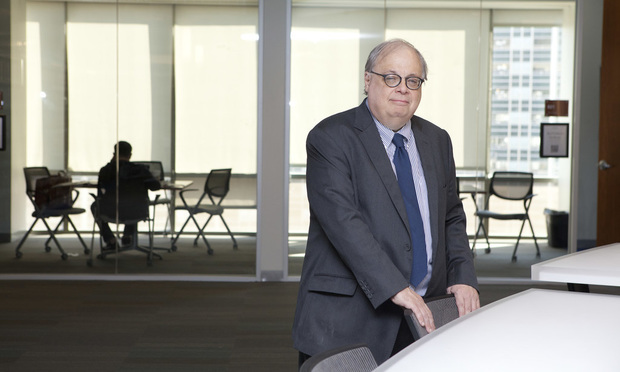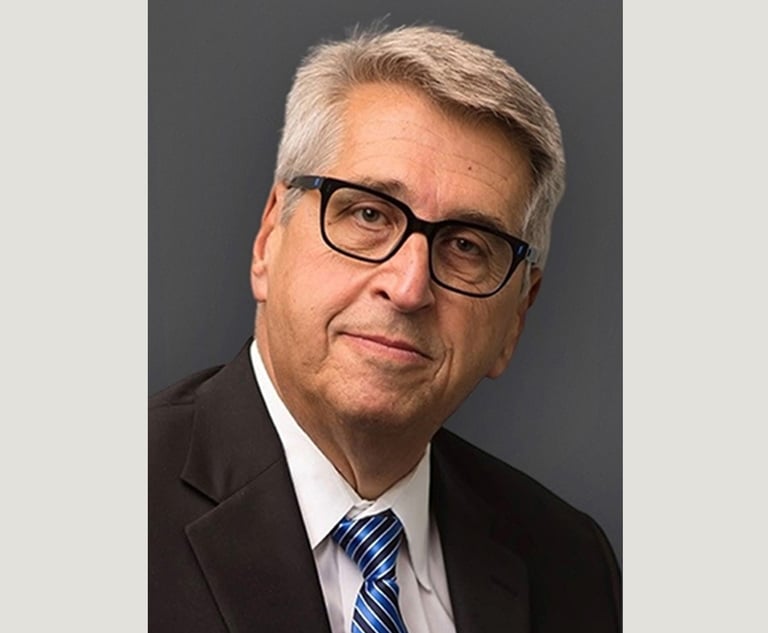Find Your Path to Better Lawyering
Three Virtues of Self Reflection
September 03, 2019 at 01:00 AM
5 minute read
 Michael P. Maslanka, assistant professor of law, UNT Dallas College of Law.
Michael P. Maslanka, assistant professor of law, UNT Dallas College of Law.
The ancient Greeks understood virtues not as mere mind sets to adopt, but rather as ways of living to embrace. First comes the virtue and only then comes the virtuous conduct. To which virtues should we as lawyers aspire? Here are my nomination for The Virtuous Trinity: Gratitude, Humility, Empathy.
Gratitude. We do nothing alone. Nothing. Ozigar Kongtrul writes in Light Comes Through: Buddhist Teachings on Awakening to Our Natural Intelligence that "the truth is that are attributes are not possessable…. No one is truly self-made from the start. So many factors contribute to who we are—we are not a closed system." Try this exercise. Consider your life without its blessings and then write out how your life could have turned out differently, not differently better, but differently worse. Doing so isolates the factors that made you who you are and over which you possessed zero control. Gratitude vaccinates against temptation, radiates an even demeanor; creates a solid center. As Hamlet lauded his counselor Horatio, "for you hast been as one in suffering all that suffers nothing. A man that Fortune's buffets and rewards/ hast taken with equal thanks."
And here's the bonus room: anger and gratitude cannot exist in the same space/time continuum. Gratitude is the virtue of counselors.
Humility. Pop quiz: word association—I say humility and you say…? Your mom, Mother Theresa; Warren Buffett? Jim Murphy, a trainer of Olympic competitors, disagrees. His pick: The Navy Seals. The rough, tough macho seals a la Seal Team 6 that took out Osama? Yes. How can that be? Because they fully understand the virtue of humility. They know in their heart-of-heart (a line from Hamlet) that the enemy always gets a vote on the outcome of a mission. So the Seals debate: burst through the front door? Crawl through the back window? Rappel down the sides of the building? Or guess what—do not attack. Read all about it in his book, Inner Excellence.
As in war, so too in litigation. It does not matter who is counsel opposite: pro se, solo, Big Law partner. Each gets a vote. A humble lawyer is aware of all surroundings, on the lookout for the flanking attack, and never satisfied with standard operating procedure. As General Patton said at the Battle of the Bulge, "we can still lose this war." Be smart by being humble. Humility is the virtue of warriors.
Empathy. While the virtue allows us to understand a client's predicament or plight, it does so much more. It is a virtue on steroids. Empathy imparts superhero powers upon lawyers because it enables us to essentially read minds. What is the other side thinking? What will be their next move? What should I anticipate? Sweet, isn't it? And except for sociopaths, we each are born with empathetic wiring courtesy of the mirror neurons in our prefrontal cortex. But how do we cultivate the virtue? Being privileged to have litigated cases against graduates of the Gerry Spence advocacy school, I can provide some insight gleaned from breaks at depositions and mediation marathons. An initial exercise is for students to tell their most painful life experiences to their classmates. Spence's theory is simple: you can't explain another's pain until you candidly acknowledge and relive your own. (Note to Big Law readers: don't even think about recommending this idea for the upcoming firm retreat.)
There's more from Spence. Read literature because it develops our right brain, the center of empathy and compassion and understanding. A recent study bears this out. Julianne Chart writes in "Novel Finding: Reading Literary Fiction Improves Empathy" in the October 4, 2013 issue of Scientific American that a recent study provides empirical evidence that reading novels with multi-dimensional characters—as opposed to novels with cardboard cutouts—increases our empathy quotient.
Poets write of the value of empathy borne of suffering.
In "Kindness," San Antonio based poet Naomi Shihab Nye writes that "Before you know kindness as the deepest thing inside/you must know sorrow as the other deepest thing." And in "Save Some Time to Dream," the Midwestern Tennyson, John Mellencamp writes "Save some time for sorrow/for it will surely come your way/Prepare yourself for failure/It will make you strong someday." Ain't that the truth? Yet Generation Z (born after 1994)—our next generation of lawyers—eschew necessary risk as a trade-off for a life of false security and fruitful conflict. They will never catch a wave because they will never wade into the water.(Read about it in The Coddling of The American Mind: How Good Intentions And Bad Ideas Are Setting Up A Generation For Failure by Greg Lukianoff and Jonathan Haidt.) How to educate Z law students and new lawyers? Require community engagement, mandate service in legal clinics, offer courses in the law and literature as prerequisites for law school graduation. Isn't the ability to mind read worth it? Empathy is the virtue of strategic thinkers.
"Find your virtue." (My apologies to the Mexican beer commercial.) Effective virtues vary by situations confronted, circumstances dealt, context involved. (A good book in a non-lawyer context is The Ideal Team Player: How to Recognize and Cultivate the Three Essential Virtues from Patrick Lencioni.) Build your life around virtues. Here's a toast to them!
Michael P. Maslanka is an assistant professor of law at UNT Dallas College of Law. His email is [email protected].
This content has been archived. It is available through our partners, LexisNexis® and Bloomberg Law.
To view this content, please continue to their sites.
Not a Lexis Subscriber?
Subscribe Now
Not a Bloomberg Law Subscriber?
Subscribe Now
NOT FOR REPRINT
© 2025 ALM Global, LLC, All Rights Reserved. Request academic re-use from www.copyright.com. All other uses, submit a request to [email protected]. For more information visit Asset & Logo Licensing.
You Might Like
View All
From Hospital Bed to Legal Insights: Lessons in Life, Law, and Lawyering
6 minute read

Nondisparagement Clauses in Divorce: Balancing Family Harmony and Free Speech
6 minute readTrending Stories
- 1CFPB Labor Union Files Twin Lawsuits Seeking to Prevent Agency's Closure
- 2Crypto Crime Down, Hacks Up: Lawyers Warned of 2025 Security Shake-Up
- 3Atlanta Calling: National Law Firms Flock to a ‘Hotbed for Talented Lawyers’
- 4Privacy Suit Targets Education Department Over Disclosure of Student Financial Data to DOGE
- 5Colwell Law Group Founder Has Died in Skiing Accident
Who Got The Work
J. Brugh Lower of Gibbons has entered an appearance for industrial equipment supplier Devco Corporation in a pending trademark infringement lawsuit. The suit, accusing the defendant of selling knock-off Graco products, was filed Dec. 18 in New Jersey District Court by Rivkin Radler on behalf of Graco Inc. and Graco Minnesota. The case, assigned to U.S. District Judge Zahid N. Quraishi, is 3:24-cv-11294, Graco Inc. et al v. Devco Corporation.
Who Got The Work
Rebecca Maller-Stein and Kent A. Yalowitz of Arnold & Porter Kaye Scholer have entered their appearances for Hanaco Venture Capital and its executives, Lior Prosor and David Frankel, in a pending securities lawsuit. The action, filed on Dec. 24 in New York Southern District Court by Zell, Aron & Co. on behalf of Goldeneye Advisors, accuses the defendants of negligently and fraudulently managing the plaintiff's $1 million investment. The case, assigned to U.S. District Judge Vernon S. Broderick, is 1:24-cv-09918, Goldeneye Advisors, LLC v. Hanaco Venture Capital, Ltd. et al.
Who Got The Work
Attorneys from A&O Shearman has stepped in as defense counsel for Toronto-Dominion Bank and other defendants in a pending securities class action. The suit, filed Dec. 11 in New York Southern District Court by Bleichmar Fonti & Auld, accuses the defendants of concealing the bank's 'pervasive' deficiencies in regards to its compliance with the Bank Secrecy Act and the quality of its anti-money laundering controls. The case, assigned to U.S. District Judge Arun Subramanian, is 1:24-cv-09445, Gonzalez v. The Toronto-Dominion Bank et al.
Who Got The Work
Crown Castle International, a Pennsylvania company providing shared communications infrastructure, has turned to Luke D. Wolf of Gordon Rees Scully Mansukhani to fend off a pending breach-of-contract lawsuit. The court action, filed Nov. 25 in Michigan Eastern District Court by Hooper Hathaway PC on behalf of The Town Residences LLC, accuses Crown Castle of failing to transfer approximately $30,000 in utility payments from T-Mobile in breach of a roof-top lease and assignment agreement. The case, assigned to U.S. District Judge Susan K. Declercq, is 2:24-cv-13131, The Town Residences LLC v. T-Mobile US, Inc. et al.
Who Got The Work
Wilfred P. Coronato and Daniel M. Schwartz of McCarter & English have stepped in as defense counsel to Electrolux Home Products Inc. in a pending product liability lawsuit. The court action, filed Nov. 26 in New York Eastern District Court by Poulos Lopiccolo PC and Nagel Rice LLP on behalf of David Stern, alleges that the defendant's refrigerators’ drawers and shelving repeatedly break and fall apart within months after purchase. The case, assigned to U.S. District Judge Joan M. Azrack, is 2:24-cv-08204, Stern v. Electrolux Home Products, Inc.
Featured Firms
Law Offices of Gary Martin Hays & Associates, P.C.
(470) 294-1674
Law Offices of Mark E. Salomone
(857) 444-6468
Smith & Hassler
(713) 739-1250







